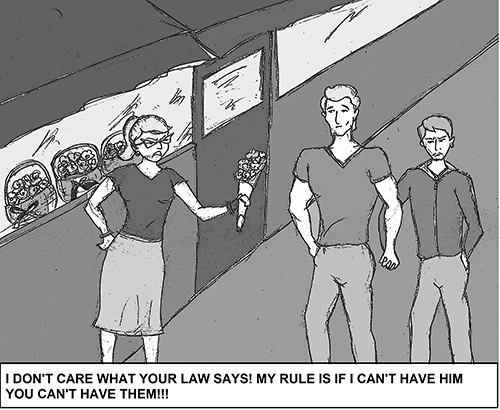
Even though Washington voters legalized gay marriage back in November, discrimination based on sexual orientation is far from gone.
This March, the American Civil Liberties Union in Washington state filed a lawsuit against the owner of Arlene’s Flowers and Gifts, Barronelle Stutzman, after she refused to provide flowers for the upcoming wedding of Robert
Ingersoll and Curt Freed.
Despite her knowledge of the state’s anti-discrimination laws, Stutzman remained firm in her decision to refuse service to the gay couple.
Lawmakers have since been hard at work trying to hold Stutzman accountable for her actions, but their efforts may go unanswered as Republicans look to a new bill that will provide exemptions to Washington’s current anti-discrimination laws.
The bill would allow business owners the right to deny services to any individual if they felt it went against their “sincerely held religious beliefs, philosophical beliefs or matters of conscience.”
While protected classes under federal law (such as race, religion or disability) wouldn’t be affected, there will be no protections for people discriminated against based on their sexual orientation.
And that’s just wrong.
The original lawsuit may have been over the sale of flowers, but what if a gay person was denied food, lodging or communication services for the same reason?
Under the proposed bill, that sort of discrimination would be legal if it resulted from the business owner’s beliefs.
After such a large step forward for civil rights, are people really this eager to leap backwards?
Luckily, the bill isn’t likely to gain any traction in the Washington Legislature this year, but its proposition demands a rethinking of our belief system as a country.
The gay marriage bill in Washington may have received enough votes to pass, but many people are still opposed to the changes.
What do bills like the one proposed by Republican lawmakers say about the longevity of the gay rights movement in Washington? They say that if people remain so opposed to the idea, future progress is stunted. They say that the opinions of the few truly outweigh the rights of many.
They say that trying to please a small group of individuals is really worth taking away the basic rights of so many people. They say it’s right to refuse someone service based on who that person loves and chooses to spend their life with.
It’s impossible for any government ruling to please all of its citizens, so trying to please everyone through changes to these laws is just as ineffective.
If you don’t like the idea that gay marriage is legal, tough luck.
Just because Washington state passed the gay marriage bill, it doesn’t mean it will affect everyone in the state.
Legalizing gay marriage doesn’t suddenly threaten the lifestyles of heterosexual couples.
And just because your personal beliefs may not match the majority beliefs of the state you live in, that doesn’t give you the right to take rights away from someone else.
Life isn’t fair.
It’s not fair that two individuals who love each other don’t have the right to get married.
It’s not fair that someone has to follow a law that they don’t fundamentally believe in.
Again: Life isn’t fair.
People have a right to their opinions and philosophies, but when their beliefs directly exclude an entire group of individuals, we have a problem.

